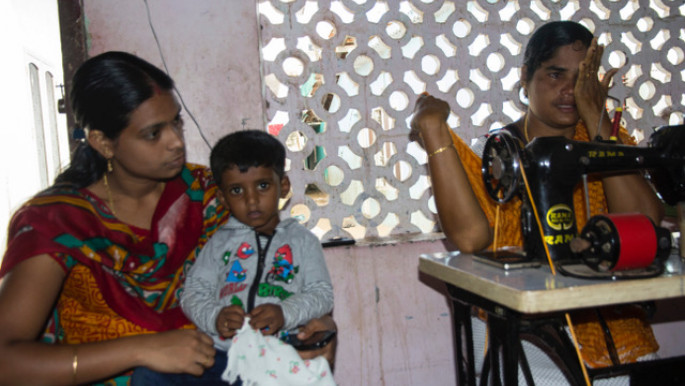Stories of origin: The invisible lives of migrants in the Gulf
Every day and in every country in the Gulf region, thousands of migrants fly in from their home countries, bringing with them their hopes and dreams but leaving their families behind.
Many of these men and women are destined for low-paid jobs in the construction, agriculture and domestic sectors. The lucky ones among them find some of the success they seek.
Their toil pays for schooling for their children, for a new roof for their family home, for the medical care needed by their parents.
But others can become trapped in an endless cycle of repeated migration, often subject to abuse and exploitation along the way.
Read also: #MeToo, say domestic workers in the Middle East
There are estimated to be about 11 million migrant workers in the GCC, comprising 67 percent of the region's workforce.
In Qatar and the UAE, they make up more than 80 percent of the total population.
And the reality for many of these workers, according to Vani Saraswathi, associate editor and director of projects at Migrant-Rights.org, is that they are all but invisible to the people around them.
 |
There are estimated to be about 11 million migrant workers in the GCC, comprising 67 percent of the region's workforce. In Qatar and the UAE, they make up more than 80 percent of the total population |  |
'Rendered faceless'
"Lower-income migrant workers are just numbers on paper, and are deliberately rendered faceless and invisible both in their home countries and in the countries they work in," Saraswathi writes in the introduction to her new book, Stories of Origin: The Invisible Lives of Migrants in the Gulf.
The idea for the book stemmed from a belief that the simple act of telling these peoples' stories might help bring about societal change, she told The New Arab.
Twitter Post
|
"About four years ago, we [at Migrant Rights] realised that by only reporting abuse and exploitation, there was no fair representation of lower-income migrants' lives. We decided to report from key origin countries, so the audience in the Gulf understood what working there meant to the individual, their families and communities."
Read also: The storytellers of Syria: Displaced women keep tradition and history alive with folktales
Saraswathi believes there are several factors that negatively impact the way low-paid migrant workers are viewed in their host countries.
Firstly, she argues, it's because of the growth of subcontracting, which means that many employers are now no longer directly responsible for their staff.
"There are now easily six to seven degrees of separation between the sponsor of the worker and the owner of the project they work on," she says.
Secondly, she lays the blame with city planners, who zone low-income houses away from city centres, so that migrants are rarely seen in wealthier neighbourhoods.
And finally, she points out that many low-income workers are not allowed into public spaces in their free time, be that a shopping mall, a museum or a park.
"So when you do see them as a sea of overalls and hardhats or pink pyjamas, you fail to see who they are beyond being the work they do," she says.
"There's no opportunity for casual, daily interactions."
 |
There are now easily six to seven degrees of separation between the sponsor of the worker and the owner of the project they work on |  |
Heartbreaking stories
The "key origin" countries Saraswathi visited and reported from for the book are India, Nepal, Indonesia, Sri Lanka, the Philippines, Uganda and Ethiopia.
The resulting text, peppered with wry observations and unpalatable truths, reveals a complex story of abject poverty, bloated agencies and unscrupulous middlemen, unreasonable working hours and unreliable employers.
Read also: Gulf migrant workers are being abused in complete silence
The book is full of memorable characters such as Nilu, an illiterate single mother and carer for her parents, who has had two unhappy stints in the GCC, one of which was abusive, and has not been able to save any money; and 25-year-old Filipina Lolly Ann, whose Saudi employers took her to work in a war-zone without her knowledge.
When asked to pick one particularly memorable encounter with a Gulf migrant, Saraswathi recalls her meeting with the wife of an Indian fisherman, Sashikumar, who had been arrested and detained by Iran while working on a Qatari-owned fishing boat.
 |
|
| Sheela (right), Sashikumar's wife [Vani Saraswathi] |
Saraswathi had followed his case closely and had worked with the authorities to help secure the release of his whole crew. A couple of years later, she visited Sashikumar's home village in India, and went to meet his wife Sheela.
"It was heartbreaking, because I remember Sashikumar being anxious and excited to get back to his pregnant wife. They had been trying for a baby for 10 years. I realised then that she had miscarried late in the pregnancy, and she was still inconsolable. "
Saraswathi discovered also that despite his ordeal, Sashi has ventured overseas once more for work, this time to Iran, because an Iranian national who he met during his detention had offered him work.
Sheela explained he had tried fishing at home to bring in an income, but was "traumatised" after his boat sank.
"He owned a boat and was deep sea fishing when it broke and no one helped him. Finally as he clung to a raft, fighting for his life, a merchant navy ship rescued him. He is scared now to go to these seas," she tells Saraswathi.
Common goals
Despite extensive travel in seven different countries while writing the book, Saraswathi said that she has come to realise that essentially, all people travelling overseas for work share the same hopes and dreams.
|
"Motivations and aspirations for migration are identical across borders and continents," she says.
"Love for their families, and a yearning for a better future for their children."
She adds that while there have been positive changes in some GCC countries in recent years regarding migrant worker welfare - Qatar and UAE both passed domestic workers' laws last year, for example - the reality of life on the ground has not changed for the majority.
"The implementation of these laws has not been strong, and the grievance mechanisms are weak," she adds.
But if laws and attitudes do change, Saraswathi is firm on how she would like the relationship between migrant workers and nationals of their host countries to grow.
"Being respectful and acknowledging their contribution ranks higher than being kind or helpful for me - even if that is very important," she says.
"Patronising and charity-like initiatives take away their agency. They haven't moved for handouts and help, but to work, earn, and save towards a better life."
Vani Saraswathi's Stories of Origin: The Invisible Lives of Migrants is available from Amazon. All profits from the book go to Migrant-Rights.org
Victoria Scott is a journalist and writer. She has previously written for Doha News and the BBC.
Follow her on Twitter: @Toryscott

![Palestinians mourned the victims of an Israeli strike on Deir al-Balah [Getty]](/sites/default/files/styles/image_684x385/public/2024-11/GettyImages-2182362043.jpg?h=199d8c1f&itok=xSHZFbmc)


![The law could be enforced against teachers without prior notice [Getty]](/sites/default/files/styles/image_684x385/public/2178740715.jpeg?h=a5f2f23a&itok=hnqrCS4x)
 Follow the Middle East's top stories in English at The New Arab on Google News
Follow the Middle East's top stories in English at The New Arab on Google News


